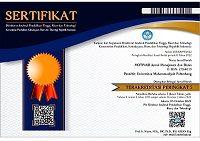Pengaruh Orientasi Kewirausahaan, Orientasi Pasar dan Orientasi Pembelajaran terhadap Inovasi Produk (Studi pada Pengusaha Kecil di Kota Palembang)
Abstract
ABSTRACT
This study aims to determine the effect of entrepreneurship orientation, market orientation and learning orientation to product innovation. The population in this research is female small business actors in the field of food processing in Palembang City. The sample in this study amounted to 150 people spread in seven sub-districts in Palembang. Sample determination technique used in this research is purposive sampling. The analysis method used in this research is linear regression analysis. The results of the study explain that entrepreneurship orientation variables have no significant effect on product innovation. Market orientation variables significantly influence product innovation. Learning orientation variables significantly influence product innovation.
Keywords
Full Text:
PDFReferences
Avlonitisa G. J. and Salavoub H. E. 2007. “Entrepreneurial orientation of SMEs, product innovativeness, and performance”, Journal of Business Research, 60 (5), 566-575.
Brush, C.G., Bruin, A.D., Gatewood, E.J. & Henry, C. 2010. Women entrepreneurs and the global environment for growth: a research perspective. Cheltenham: Edward Elgar Pub.
Calantone, R. J., Cavusgil, S. T., & Zhao, Y. 2002. Learning orientation, firm innovation capabality, and firm performance. Journal of Industrial Marketing Management, 31, 515-524.
Chaston, I. & Scott, G.J. 2012. Entrepreneurship and open innovation in an emerging economy. Management Decision 50 (7), 1161-1177.
Correa, J.A., Garcia-Morales, V.J. and Cordon-Pozo, E. 2007. ‘Leadership and Organizational Learning’s Role on Innovation and Performance: Lessons from Spain’, Industrial Marketing Management, 36, 3, 349-359.
Cunningham, L. X. & Rowley, C. 2007. Human resource management in Chinese small and medium enterprises. Personnel Review, 36 (3), 415-439.
Elg, Ulf. 2005. A Study of Inter-Firm Market Orientation Dimensions in Swedish, British and Italian Supplier-Retailer Relationship, Land University, Institute of Economic Research, Working Paper Series No. 2005/6.
Ghozali, Imam. 2005. Application of Multivariate Analysis with SPSS Programme, 3th edition, Semarang, BP UNDIP.
Goktan, A.B. and Gupta, V.K. 2013. “Sex, gender, and individual entrepreneurial orientation: evidence from four countries”, International Entrepreneurship and Management Journal, 11 (1), 95-112.
Gopal, Raja 2008. Effect of Customer Services Efficiency and Market Effectiveness on Dealer Performance, Department of Marketing, Business Division Monterrey Institute of Technology and Higher Education, ITESM.
Greenhalgh, T., Robert, G., Macfarlane, F., Bate, & P. Kyriakidou, O. 2004. ‘Diffusion of Innovations in Service Organizations: Systematic Review and Recommendations’, The Milbank Quarterly, 82 (4), 581-629.
Grinstein A. 2008. “The effect of market orientation and its components on innovation consequences: A meta-analysis”, Journal of the Academy of Marketing Science, 36 (2), 166-173.
Hammond, Kevin I., Webster, Robert. L & Harmon, Harry A. 2006. Market Orientation, Top Management Emphasis and Performance within University Schools of Business: Implications for Universities, The Journal of Marketing Theory and Practice, 14 (1), 69-85.
Hanafi, N. 2012. Learning orientation, entrepreneurial orientation, competitive advantage and business performance of women-owned SMEs in Malaysia, Unpublished DBA dissertation, UUM, Kedah.
Idar, R. & Mahmood, R. 2011. Entrepreneurial and market orientation relationships to performance: The SME perspective. Interdisciplinary Review of Economics and Management, 1 (2), 1-8.
Júnior, E.I. & Gimenez, F.A.P. 2012. “An Investigation of the Reliability and Validity of an Entrepreneurial Orientation Index in Brazil”, Academy of Entrepreneurship Journal, 18 (2), 41-56.
Kelley, D., Singer, S. and Herrington, M., 2016. 2015/16 GLOBAL REPORT - GEM Global Entrepreneurship Monitor, Babson College, Universidad del Desarrollo, Universiti Tun Abdul Razak, Tecnológico de Monterrey, London Business School, Babson Park, MA, United States; Santiago, Chile; Malaysia; Mexiko; London, United Kingdom.
Keskin, H. 2006. Market orientation, learning orientation, and innovation capabilities in SMEs an extended model. European Journal of Innovation Management, 9 (4), 396-417.
Kickul, J., Jianwen, L., Gundry, L. & Iakovleva, T. 2010a. “Firm resources, opportunity recognition, entrepreneurial orientation and performance: the case of Russian women-led family businesses”, International Journal of Entrepreneurship & Innovation Management, 12 (1), 52-69.
Kirca, A.H., Jayachandran, S. & Bearden, W.O. (2005). Market orientation: a meta-analytic review and assess-ment of its antecedents and impact on performance. Journal of Marketing, 69 (2), 24-41.
Kok, Robert A.W., Hillebrand, Bas & Biemans, Wim G. 2003. Market-Oriented Product Development as an Organizational Learning Capability: Findings from Two Cases, SOM Research Institute.
Kundu, S.C. & Rani, S. 2004. “Entrepreneurial orientation of aspiring managers: a study”, International Journal of Management and Enterprise Development, 1 (3), 233-250.
Kwak H., Jaju A., Puzakova M. & Rocereto J. F. 2013. “The connubial relationship between market orientation and entrepreneurial orientation”, Journal of Marketing Theory and Practice, 21 (2), 141-161.
Lumpkin, G.T. & Dess, G.G. 2001. Linking two dimensions of entrepreneurial orientation to firm performance: the moderating role of environment and industry life cycle. Journal of Business Venturing, 16 (5), 429-451.
Mahmood, R. & Hanafi, S. 2012. The effect of entrepreneurial and learning orientations on performance of women-owned SMEs. Paper presented at the 3rd. Terengganu International Business and Economics Conference, Kuala Terengganu, 18-20 October.
Mavondo, F.T., Chimhanzi, J., & Stewart, J. 2005. Learning orientation and market orientation: relationship with innovation, human resource practices and performance. European Journal of Marketing, 39, 1235-1263.
Ndemo, B. & Maina, F.W. 2007. Women entrepreneurs and strategic decision making. Management Decision, 45 (1), 118-130.
Nthuni, S. K., 2014. Influence of Social Capital on the Growth of Small and Medium Enterprises in Kenya. International Journal of Social Sciences and Entrepreneurship. Special Issue 2.
Perin, M.G. & Sampaio, C.H. 2003. The relationship between learning orientation and innovation, paper presented at the European Marketing Academy Conference, Glasgow, UK.
Rahaba. 2012. Innovativeness model of small and medium enterprises based on market orientation and learning orientation: testing moderating effect of business operation mode. Procedia Economics and Finance, 4, 97-109.
Renko, Carsrud & Brännback, 2009. The effect of market orientation, entrepreneurial orientation, and technological capability on innovativeness: A study of young biotechnology ventures in the United States and in Scandinavia. Journal of Small Business Management, 331-369.
Rhee, J., Park, T. & Lee, D.H. .2010. ‘Drivers of innovativeness and performance for innovative SMEs in South Korea: mediation of learning orientation’, Technovation, 30 (1), 65-75.
Schindehutte, Minet, Morris, Michael H. & Kocak, Akin. 2008. Understanding Market-Driving Behavior: The Role of Entrepreneurship, Journal of Small Business Management, 46 (1), 4-26.
Sen B. 2006. “Market orientation: A concept for health library”, Health Information and Libraries Journal, 23 (1), 23-31.
Sinkula, James M., William E. Baker, & Thomas, Noordewier. 1997. "A Framework for Market-Based Organizational Learning: Linking Values, Knowledge and Behavior", Journal of the Academy of Marketing Science, 305-318.
Stata, R. 1989. Organizational Learning-The Key to Management Innovation’, Sloan Management Review, 30, 63-73.
Sugiyono. 2010. Business Research Methods, Bandung, Alfabenta.
Tang, J. 2006. Competition and Innovation Behavior, Research Policy, 35, 68-82.
Verhees F. J. H. M. & Meulenberg M. T. G. 2004. “Market orientation, innovativeness, product innovation and performance in small firms”, Journal of Small Business Management, 42 (2), 134-154.
Vidic, F. 2013. Entrepreneurial Orientation (EO) and Knowledge Creation (KC). International Journal of Economic Sciences and Applied Research 6 (2), 103-124.
Wiklund, J. & Shepherd, D. 2005. “Entrepreneurial Orientation and Small Business Performance: A Configuration Approach”, Journal of Business Venturing, 20 (1), 71-91.
Zainul, Mohammad; Astuti, Endang Siti ; Arifin, Zainul & Utami, Hamidah Nayati. The Effect of Market Orientation toward Organizational Learning, Innovation, Competitive Advantage, and Corporate Performance (A Study at SME Sasirangan in South Kalimantan), Journal of Administrative Sciences and Policy Studies, 4 (1), 1-19.
Zhang, J., & Duan, Y. 2010. The impact of different types of market orientation on product innovation performance evidence from Chinese manufacturers. Management Decision, 48 (6), 849-867.
Zhou K. Z., Yim C. K. & Tse D. K. 2005. “The effects of strategic orientations on technology and market-based breakthrough innovations”, Journal of Marketing,. 69 (4), 42-60.
DOI: https://doi.org/10.32502/mti.v2i2.2045
Refbacks
- There are currently no refbacks.
Copyright (c) 2019 MOTIVASI Jurnal Manajemen dan Bisnis
Motivasi: Jurnal Manajemen dan Bisnis is Published by Management Department, Economic and Business Faculty, Muhammadiyah University of Palembang. This work is licensed under a Creative Commons Attribution-ShareAlike 4.0 International License.
Indexed/Abstracted






.png)
.png)



